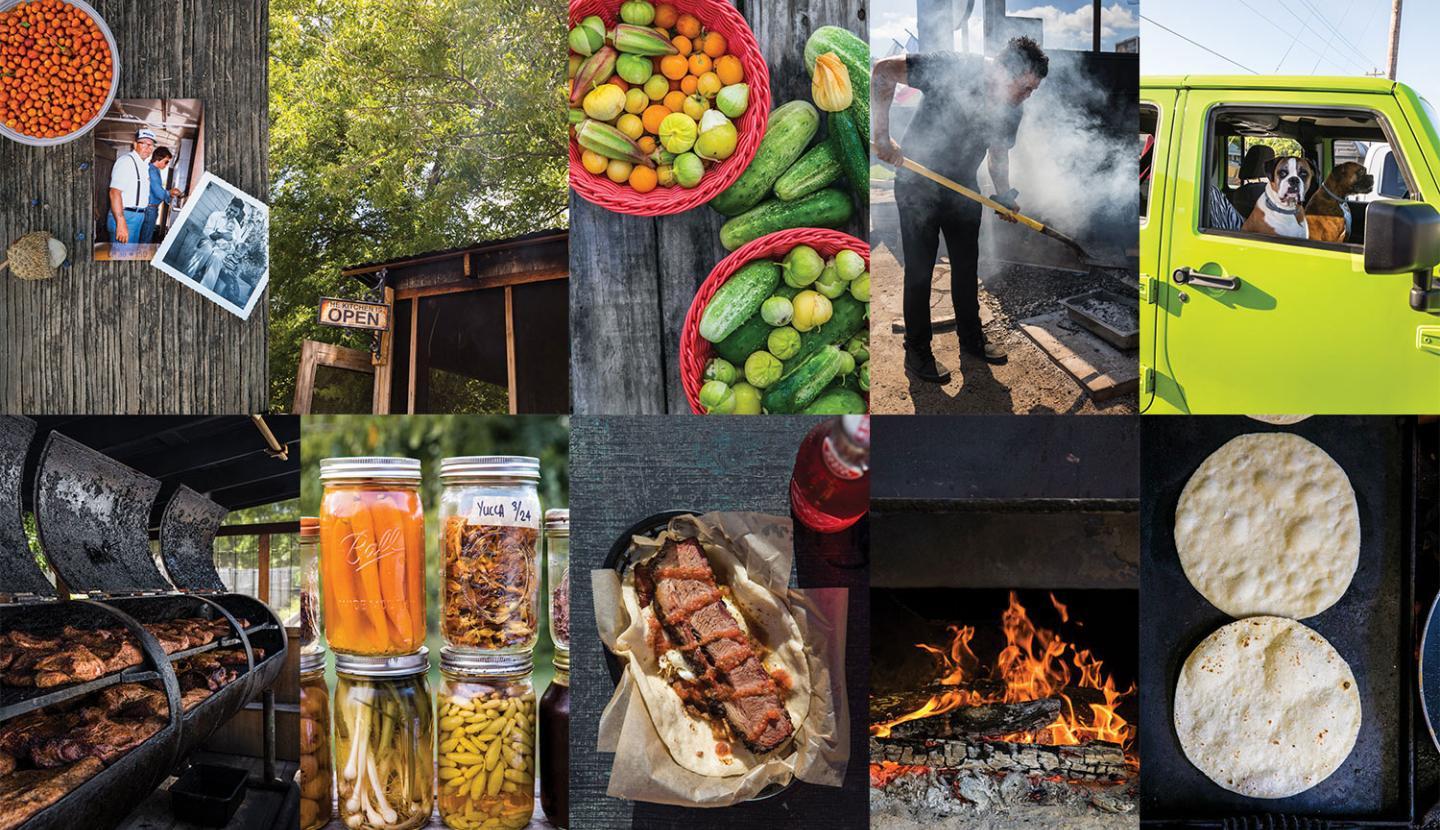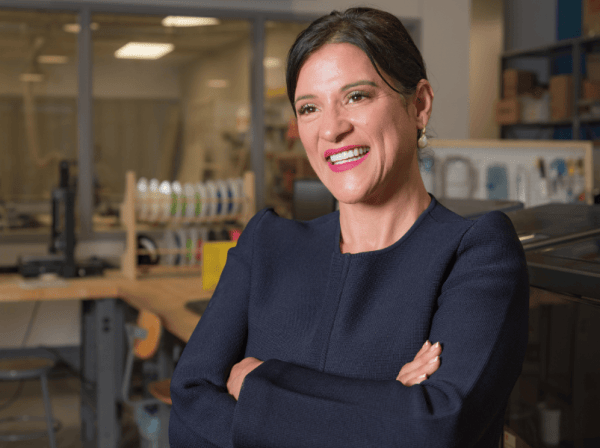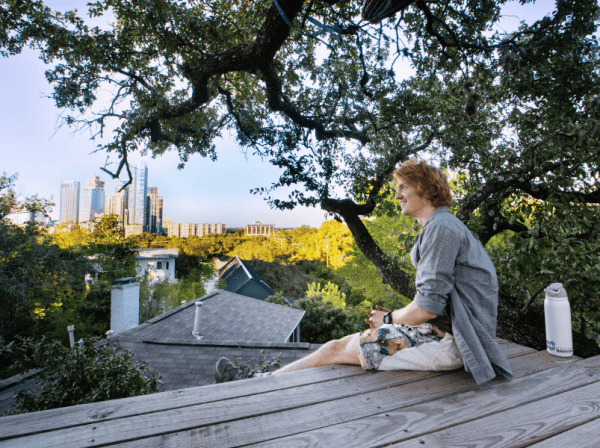Playing with Fire
If there is an unofficial flavor of the state of Texas, it’s brisket: perfectly smoked with a crush of spice on the outside giving way to a soft, savory inside. It seems scientifically impossible for meat to melt in the mouth, but the best-cooked briskets dissolve the minute they hit the tongue.
Bragging rights over who has the best barbecue in Texas are constantly shuffled, and barbecue braggadocio has become a statewide sport, with communities of fans steadfastly staking claim to their favorites.
But two people have recently changed the rules of the game in their own ways. Miguel Vidal ’03, owner of Valentina’s, offers an authentic Tex-Mex take on barbecue, while Mattison (Matti) Bills ’15, co-owner of Mum Foods, serves critic-favorite pastrami built on an appreciation for locally sourced meat.
Both are storming the Austin barbecue scene by infusing it with new ideas and recipes. And the inspiration for both of their ventures started at St. Edward’s.
In the Source They Trust
At the Texas Farmers’ Market at Mueller on a Sunday morning, sellers are setting up their tents and tables and swapping hellos. At Mum Foods, eighth-generation Texan Bills and Geoffrey Ellis, her partner in barbecue and life, ready the scale, the chopping block and a hefty roll of butcher paper.
Within an hour of opening, they’ll have dozens of faithful customers standing in line in the early-summer heat, waiting to buy their Wagyu brisket, sausage, chicken and pastrami. The latter was named best in the state by Texas Monthly’s barbecue editor, Daniel Vaughn.
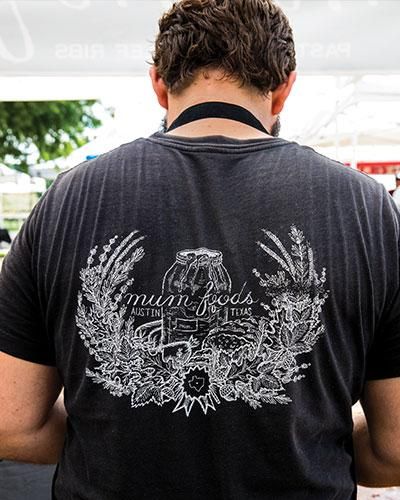
“It has taken me five years to find the best in the state,” Vaughn wrote of Bills’ and Ellis’ creation. He said: “It’s like the Platonic ideal of Texas pastrami.”
The whole concept of their business begins with the source — “Mum” (as in mother) echoes this importance for Bills, who spent a lot of time in and out of school reflecting on food. She started at St. Edward’s pursuing a degree in business before changing her major to Environmental Science and Policy.
She remembers an assignment from Professor and Coordinator of Environmental Science and Policy Peter Beck that was a turning point for her. “It was a hugely impactful class,” she says. “We went three days without electricity — it literally changed the way my body felt. I was able to be in tune with nature in ways that I didn’t even know were possible.”
As part of the assignment, she hosted a dinner party by candlelight where she served food cooked over a firepit. “It was wonderful,” she remembers. No cell phones or social media, no TV or other interruptions. “It brought people together in a way that we just can’t access anymore,” she says.
Around that time, Bills spent a year as a vegan as part of her journey to explore where food comes from and people’s relationship to it. She gradually returned to eating meat, motivated by a desire to consume a broader diet of local foods and by a longing to reconnect with the foods of her Central Texas upbringing. That thoughtfulness and intention became the cornerstone of her business venture with Ellis.
The business buys meat from four or five different small farms and is always trying to find new sources. It’s a more expensive and complicated route for them, but it’s a core part of Mum’s mission. The meat is all locally raised, pastured, and hormone- and antibiotic-free, and the cattle never leave the state of Texas.
Matti Bills ’15, co-owner of Mum Foods, uses a cooking process that is true to traditional Central Texas–style barbecue. “We use an offset smoker and cook with a fire of post oak wood, without any electricity or propane. We slow smoke for 12 hours twice a week in South Austin,” she says.
“By buying from places that don’t send the animals off — that do it all in one closed loop — we’re keeping the money away from the big packing houses and putting it toward these family-owned businesses,” she says.
Bills says that asking questions about food sources is changing the industry. “It helps more than just the ranchers. It provides the ranchers with a market to sell these products that are better for our state, our animals and our consumers,” she says.
The Texas Twist
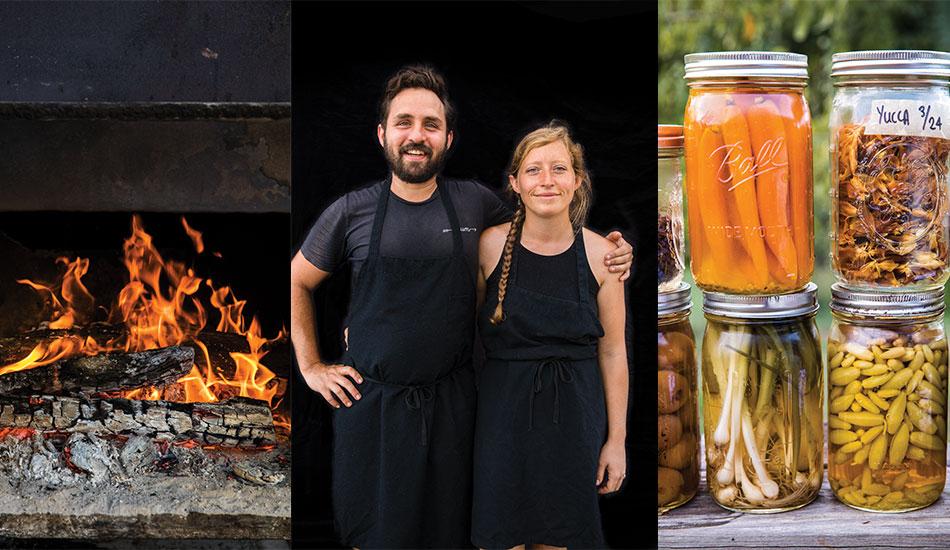
The duo of Bills and Ellis — plus one additional employee who helps them with smoking — sells about 675 pounds of meat per week at Austin-area farmers markets.
The traditional smoked brisket starts with high- quality Wagyu beef and is a bare-bones traditional recipe that uses only salt and pepper. Their highly acclaimed pastrami was the result of a uniquely Texas experiment with some surplus brisket.
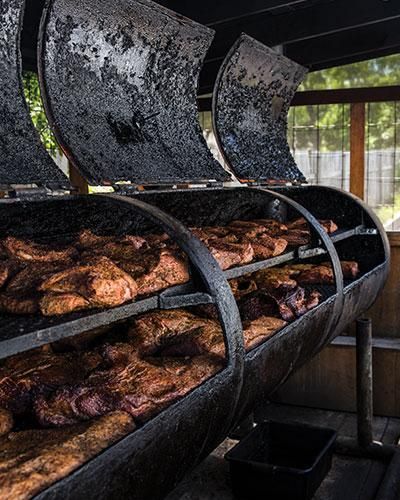
“We were interested in turning the lean end of the brisket into pastrami, and then pretty soon we were starting to turn whole briskets into pastrami,” curing and smoking it instead of steaming it as chefs do in New York delis. “The moist pastrami is so decadent and delicious. It’s something that really set us apart,” she says.
“At most places in New York, they’ll use either navel or top round, but we use brisket, which we think has just the perfect fat content,” Bills says. The result is soft and peppery, delicate and luxurious.
Bills and Ellis dream of one day opening a storefront in a small town like Elgin, and a companion bakery.
“We’d be honored to have the opportunity to continue the history of Texas barbecue in Elgin, alongside historic barbecue joints Southside Market and Meyer’s,” says Ellis.
“And then I can finally fulfill my dreams of having a small farm,” adds Bills. “Every day people ask us about where the food comes from, how it’s raised, what type of feed they use. The world is a better place with increased food transparency.”
Underneath all the success, Bills has always wanted to be a farmer. She loves the production of food more than anything. Somewhere along the way, barbecue took hold as a complementary passion — sourcing, curing, smoking. It brings people together, much like her electricity-free dinner party experiment during college.
“This found me,” says Bills. “I love cooking with fire. It’s a dynamic and variable experience, much like farming. You have to work with the flow of nature in lieu of trying to control it. It’s difficult work, but it’s stimulating and fulfilling.”
Bare Bones and Backyard
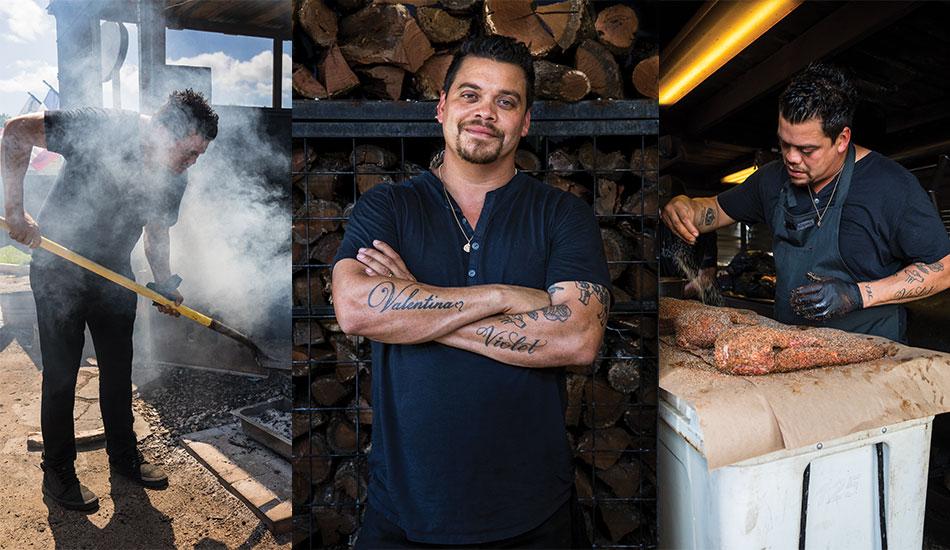
Miguel Vidal paces around the four trailers that house the pits and kitchens on a property he leases on Manchaca Road in South Austin. He dreams of one day breaking ground and creating a permanent restaurant to house Valentina’s, which is currently a compound of free-standing smokers and food trailers and a large covered picnic area. Even without a brick-and-mortar restaurant, he’ll sell 4,000 pounds of brisket this week. Business is good, he says. But he’s hungry for more.
Nearly 20 years ago, when Vidal was a student, he lacked a clear direction. He was a Communication major, then shifted to media production. He often felt unfocused in pursuit of his future career. He held down a job at the restaurant Ranch 616 downtown, while also playing varsity soccer (serving as captain for two years), and dreamed of becoming a professional athlete.
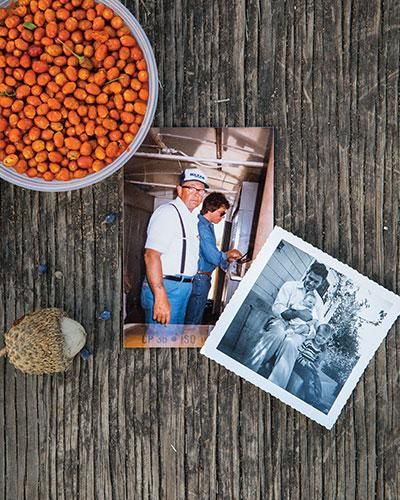
“I worked hard at soccer more than anything, but it got to a certain point where I kind of got lost,” he says. “I knew that I didn’t want to have a corporate job. I didn’t want to work for anyone. I had always had an entrepreneurial spirit, but I just didn’t know how to go about it at the time.”
Vidal tore the medial collateral ligament in his knee during his fourth year at St. Edward’s. He recovered and was a student soccer coach for one semester, while also playing for the Austin Lightning, a development
team. He moved to Miami and tried to make a go of playing semi-professional soccer, traveling with teams across the United States.
While in Miami, he worked as a waiter. In his downtime, when he wasn’t playing soccer, he’d work for free in restaurants, just to hang out with chefs and learn new recipes and techniques.
He returned to his home in San Antonio whenever he could, finding comfort as his knee injuries persisted. As his soccer dreams faded, he was left without a real idea of what he could do with his life.
Then, on one of his visits home, the threads of his life started to come together — the entrepreneurial spark he started to feel as a student, the love of food he nurtured in Miami and the comfort of his family that sustained him through challenging times.
Home was where his dad and uncle smoked barbecue, and his mom cooked traditional Mexican-American cuisine with a real San Antonio style — rice and beans, beef picadillo, fideo, homemade tortillas, arroz con pollo. In his youth, Vidal considered this provincial and average, but living in Austin and Miami gave him a new perspective.
“I went home to my parents’ house, and my dad had made barbecue,” he remembers. “And I was sitting there eating, taking a couple slices of my dad’s brisket and my mom’s tortilla. I put some avocado and salsa on the taco, and rice and beans on the side, and I’m like, ‘This is it, Dad: Tex-Mex barbecue. This is what I want to do. I’m going to open up a restaurant with this food right here: bare bones, what we do in the backyard, what your cousins do. A true representation of Tex-Mex food — what Tejanos eat.’”
His parents, like Vidal before, didn’t see the food as anything notable. It was just what they ate. But Austin diners begged to differ.
Miguel Vidal ’03 grew up watching his dad use mesquite wood to smoke barbecue. Valentina’s now goes through about two cords of mesquite wood each week.
Barbecue for the Soul
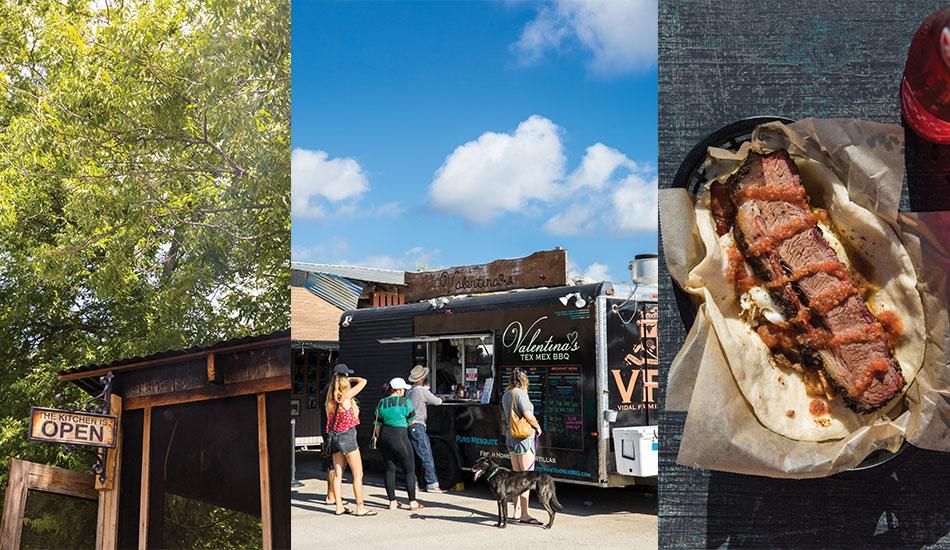
The original location of Valentina’s, named for Vidal’s oldest daughter, opened during SXSW in 2013 in a small trailer near Star Bar on West 6th Street. Vidal had spread the word to a few friends to generate pre-opening buzz, and it worked: When he took the first order, 100 people were waiting in line.
He refused to compromise on quality even then, rolling fresh tortillas by hand in spite of the crowds (“I’m pretty adamant about making our own tortillas. I’m from San Antonio, and my mom would slap me if I didn’t do it!”). He improvised when his crew ran out of food for the throngs that showed up in the early morning hours.
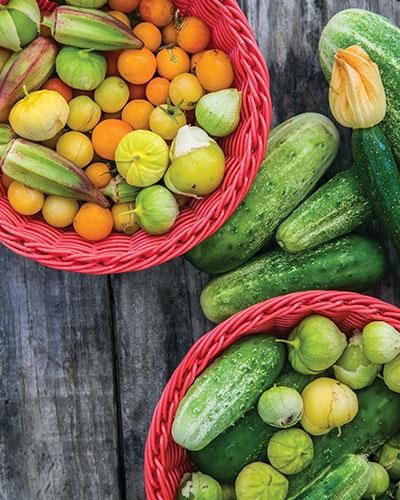
One day, when he’d run out of the brisket, ribs and pork butts typically used in barbecue, he created Mexican hot dogs — now officially called Tejano Dogs — with Kosher all-beef franks smoked for up to an hour, then seared on a flat-top grill, and served with caramelized onions, habañero mustard and salsa atop a freshly made tortilla. They, along with other dishes he created out of necessity, still make an appearance as daily specials.
In 2015, he opened another food trailer, Violet Taco (named for his youngest daughter) on East Cesar Chavez. He moved the business several times before deciding to focus his energies — and his staffing — on a permanent location for Valentina’s on Manchaca Road in South Austin. “Violet Taco was thriving, but so was Valentina’s. I had to make a choice because I needed another kitchen and double the staff at Valentina’s.”
Valentina’s has become known as the Tex-Mex barbecue fusion spot in Austin, but with an emphasis on flavor that meanders into creative territories: Pork belly with caramelized onions. Tomatillo crema with those soft, fresh tortillas, charred and crisp in just the right spots.
As he surveys a trailer at his restaurant, Vidal points to the spreadsheets, organized lists, handbooks and event workflow charts he’s created to run his business.
“This is all stuff I didn’t think was going to help me from my college courses, but it does,” he says. “Everything in the Communication program — like new communication research or interpersonal communication — all those things I take with me now."
Even soccer has played a reprising role. A pep talk to his staff includes allusions to a hotshot soccer player who is only as successful as his determination and level of coachability.
Those were lessons Vidal says have been reinforced later in life.
“I wasn’t ready to seek the guidance I should have” in college, he says. “I was a little too arrogant at the time. Even though I wanted to be my own boss, I still needed to have some sort of mentorship.”
His process may have been unconventional and the path a little unclear at times, but Vidal held fast to the risk-taking and entrepreneurial thinking he saw both at St. Edward’s and in Austin’s thriving culinary scene.
“His barbecue and what he does is probably my favorite,” says Matt Pittman, owner of Meat Church BBQ and Seasoning in Waxahachie.
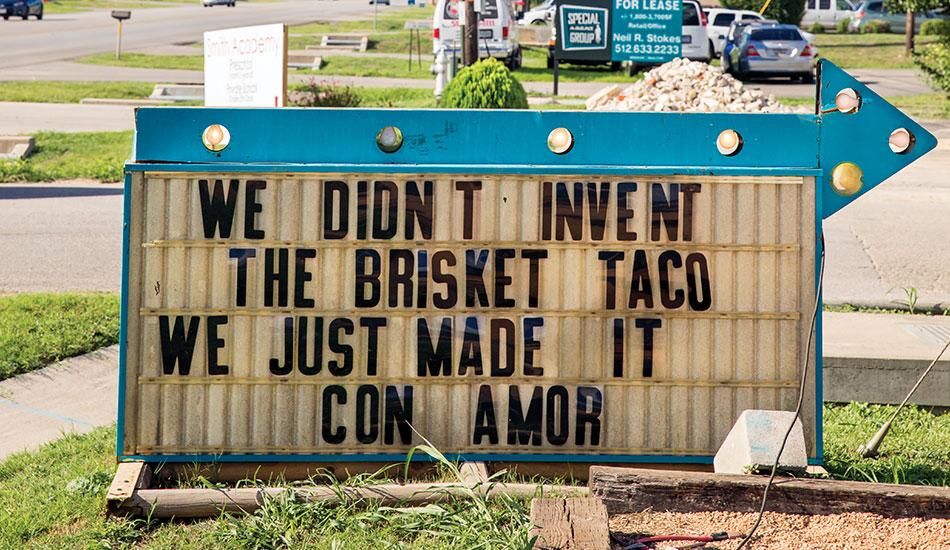
“I think what he’s done is unreal. It’s almost gutsy to open a barbecue restaurant in Austin these days, and you have to go through Austin — drive south of Austin — to get to Valentina’s,” says Pittman. “He has a place where literally no one has said anything bad about it. It speaks to my soul, basically. He’s so meticulous, he can’t take his eyes off his business. He’s involved in everything.”
Vidal simply calls his approach hecho con amor (made with love). He says you have to feel cooking from your heart, not just from recipes.
Where to Try It
Hungry for some ’que from fellow alumni? Check out Miguel Vidal’s and Matti Bills’ delicacies for yourself at these locations:
Mum Foods
Texas Farmers’ Market at Lakeline Mall
11200 Lakeline Mall Dr., Cedar Park
Saturdays, 9 a.m. to 1 p.m. year round
Barton Creek Farmers’ Market
2901 South Capital of Texas Hwy., Austin (at the back of the Barton Creek Square Mall parking lot)
Saturdays, 9 a.m. to 1 p.m. year round
Texas Farmers’ Market at Mueller
4209 Airport Blvd., Austin
Sundays, 10 a.m. to 2 p.m. year round
Valentina's
11500 Manchaca Rd., Austin
Monday through Sunday,
7:30 a.m. until everything is sold out
Photography by Wynn Meyers '13
